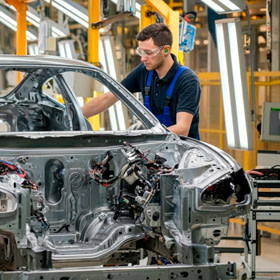How the Farming Industry Can Recover Waste Heat to Cut Costs and Improve Resilience Feb 24th, 2026

Across today’s agriculture and farming sector, energy is as critical as seed and soil. Greenhouses, barns, poultry houses, grain dryers, and on‑farm processing lines all depend on fans, blowers, heaters, and refrigeration to keep plants and animals in narrow comfort bands.
In some intensive greenhouse operations, energy can account for up to 85% of total operating costs, with a large share tied to heating and ventilation systems. At the same time, much of that purchased energy exits the farm as warm exhaust air that is simply blown outside.
Driving Efficiency: How Air-to-Water Waste Heat Recovery Can Revolutionize the Automotive Industry Jan 19th, 2026

The automotive industry produces more than 90 million vehicles each year—powering global mobility but consuming vast amounts of energy in the process. From foundries to paint shops, manufacturing is highly heat-intensive, resulting in significant costs and carbon emissions. As energy markets fluctuate and climate regulations tighten, car manufacturers are under pressure to reduce both. The good news? It’s possible to cut emissions and costs without sacrificing operational stability—through air-to-water waste heat recovery.
How Water Treatment Plants Can Turn Waste Heat Into Working Heat Nov 14th, 2025

Water treatment is essential—and energy-intensive. In the U.S., municipal and industrial plants use over 30 billion kWh annually, placing them among the largest municipal energy consumers. Their biggest loads—aeration, pumping, and sludge handling—shed significant heat through exhaust and ventilation systems. At the same time, these facilities often require heat elsewhere, revealing a large and largely untapped opportunity for energy recovery.
How Paint and Coating Plants Capture Energy Behind the Finish Oct 27th, 2025

The global paint and coatings industry—spanning everything from architectural paints to automotive and industrial finishes—is worth more than $186 billion worldwide and still growing. Behind that success are energy-intensive processes that mix, apply, and cure coatings under precise conditions. Continuous ovens, drying tunnels, and ventilated spray booths run hot, releasing significant waste heat. By reclaiming that energy with air-to-water (ATW) heat recovery systems, plants can turn exhaust into usable hot water—boosting efficiency while cutting costs and emissions.
Ceramic Tile Manufacturing Cuts Costs and Emissions with Waste Heat Recovery Sep 23rd, 2025

Ceramic and tile manufacturing is extremely energy-intensive, with kilns, dryers, and glaze lines driving high fuel and electricity costs—often up to 30% of total production expenses. At the same time, large amounts of heat are wasted through exhaust and flue gases. Air-to-water waste heat recovery (ATW WHR) offers a smart solution by capturing this unused energy, helping manufacturers reduce costs, lower emissions, and improve sustainability with a fast return on investment.
Smarter Thermal Recovery in Glass Production: Harnessing Heat and Reducing Waste Jun 12th, 2025

Glass manufacturing is among the most energy-intensive industries, rivaling steel, cement, and chemicals. Furnaces run above 1,500°C, operate nonstop, and leave no margin for error. But much of that energy escapes unused—vented as high-temperature exhaust. Waste heat recovery captures this lost energy and redirects it into valuable use, turning waste into efficiency.
How Correctional Facilities Can Capture Heat That’s Going to Waste May 15th, 2025

The U.S. correctional system, housing over 1.9 million people in 5,500+ correctional facilities, operates nonstop—providing meals, housing, medical care, and more. This constant activity consumes vast amounts of fuel, much of which is lost as waste heat. Air-to-water (ATW) heat recovery systems offer a smart solution, capturing that heat to cut fuel use, lower utility costs, and reduce environmental impact.
The Strategic Advantage of Air-to-Water Waste Heat Recovery for Military Installations Apr 9th, 2025

Military bases operate as self-contained communities with intense energy and water demands. These installations function like microcosms of society, providing everything from housing and dining to medical care and industrial operations. They face unique resource challenges that most civilian facilities will never encounter, as they must maintain operational readiness 24/7 while often operating in remote or hostile environments where resource security can't be taken for granted.
5 Effective Applications of Air-to-Water Waste Heat Recovery for the Education Sector Mar 19th, 2025

Educational institutions, from elementary schools and high schools to, are energy-intensive ecosystems. Heating, cooling, and hot water demands drive up operational costs and carbon emissions, often straining. With dollars stretched as far as possible, schools must find smart, cost-effective ways to reduce expenses while still meeting their energy needs.
One promising solution that offers long-term savings is to adopt waste heat recovery systems that capture and reuse otherwise wasted thermal energy.
How Hospitals Can Save Big with Air-to-Water Waste Heat Recovery Feb 24th, 2025

Hospitals are among the most energy-intensive facilities, operating non-stop to meet critical health and safety standards. With constant demands for hot water, sterilization, and climate control, their energy costs can be substantial. This continuous operation uniquely positions hospitals to benefit from waste heat recovery systems, which can significantly reduce energy expenses and environmental impact.